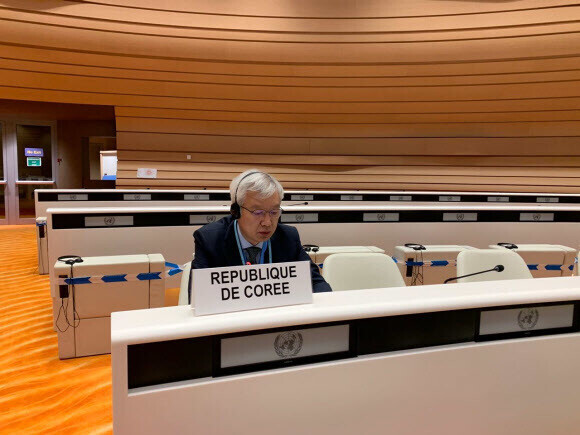hankyoreh
Links to other country sites 다른 나라 사이트 링크
UNCTAD classifies S. Korea as developed economy
This is the first time the UN agency has upgraded a member state’s development status since its establishment in 1964

The UN Conference on Trade and Development (UNCTAD) has reclassified South Korea as a developed economy. This is the first time the UN agency has upgraded a member state’s development status since its establishment in 1964.
“In the closing session of its 68th board meeting on July 2, the UN Conference on Trade and Development unanimously decided to move South Korea from Group A [Asian and African countries] to Group B [developed economies],” South Korea’s Ministry of Foreign Affairs (MOFA) said Sunday.
“We’d pursued a move to the group of developed economies in order to take on a bigger role befitting the reality of Korea’s elevated status on the international stage. That includes the fact that we’re now the world’s 10th largest economy, that we hosted the P4G Summit, and that we attended the Group of Seven summit [as an observer country]. That decision was finalized in this meeting of the board.”
“Korea’s move to the group of developed economies definitely confirms Korea’s status to all countries, both developed and undeveloped, while showing that Korea is a successful example of building a bridge between the two groups,” MOFA added.
Korea is the first country that UNCTAD has moved to the group of developed economies.
UNCTAD, which was established in 1964 to promote the industrialization of developed countries and their participation in international trade, divides member states into four groups: Group A (99 countries), Group B (31 countries), Group C (33 countries in Central and South America), and Group D (25 countries in Eastern Europe and Russia).
Yonhap News reported that Pakistan’s envoy to Geneva, speaking on behalf of developing countries in Asia and the Pacific, expressed the hope that Korea’s change of status would enable it to serve as a mediator between the various groups. The EU also congratulated South Korea on its entry into the group of developed countries.
Lee Tae-ho, South Korea’s senior envoy to the UN office in Geneva, told the board that “South Korea is a success story that exemplifies the vision expressed in UNCTAD’s founding documents, which describe trade as an important tool for economic development.”
“Through this move to the group of developed countries, South Korea will play a more active role as a bridge [between developed countries and developing countries],” Lee said.
Nevertheless, Korea’s change of status isn’t expected to have a direct impact on its activity inside UNCTAD.
The actual negotiations at UNCTAD have been oriented on the group of developing countries (Group of 77, or G77) and China, the European Union (EU), developed countries outside the EU (known as JUSSCANNZ), and the Eurasian Economic Union (EAEU).
While South Korea belonged to the G77 when it joined UNCTAD, it left that alignment when it joined the Organisation for Economic Cooperation and Development, known as the club of advanced economies, in 1996. Currently, it operates as part of JUSSCANNZ alongside countries including the US, Japan, Switzerland, Canada, and Turkey.
Therefore, this change of status can be regarded as symbolizing official recognition that Korea has become a major developed country on the global stage.
Korea told the World Trade Organization in October 2019 that it would give up its developing country status. That revocation will have a significant impact on its balance of trade.
By Gil Yun-hyung, staff reporter
Please direct comments or questions to [english@hani.co.kr]

Editorial・opinion
![[Column] Park Geun-hye déjà vu in Yoon Suk-yeol [Column] Park Geun-hye déjà vu in Yoon Suk-yeol](https://flexible.img.hani.co.kr/flexible/normal/500/300/imgdb/original/2024/0424/651713945113788.jpg) [Column] Park Geun-hye déjà vu in Yoon Suk-yeol
[Column] Park Geun-hye déjà vu in Yoon Suk-yeol![[Editorial] New weight of N. Korea’s nuclear threats makes dialogue all the more urgent [Editorial] New weight of N. Korea’s nuclear threats makes dialogue all the more urgent](https://flexible.img.hani.co.kr/flexible/normal/500/300/imgdb/original/2024/0424/7317139454662664.jpg) [Editorial] New weight of N. Korea’s nuclear threats makes dialogue all the more urgent
[Editorial] New weight of N. Korea’s nuclear threats makes dialogue all the more urgent- [Guest essay] The real reason Korea’s new right wants to dub Rhee a founding father
- [Column] ‘Choson’: Is it time we start referring to N. Korea in its own terms?
- [Editorial] Japan’s rewriting of history with Korea has gone too far
- [Column] The president’s questionable capacity for dialogue
- [Column] Are chaebol firms just pizza pies for families to divvy up as they please?
- [Column] Has Korea, too, crossed the Rubicon on China?
- [Correspondent’s column] In Japan’s alliance with US, echoes of its past alliances with UK
- [Editorial] Does Yoon think the Korean public is wrong?
Most viewed articles
- 1‘We must say no’: Seoul defense chief on Korean, USFK involvement in hypothetical Taiwan crisis
- 2N. Korean delegation’s trip to Iran shows how Pyongyang is leveraging ties with Moscow
- 3‘Weddingflation’ breaks the bank for Korean couples-to-be
- 4Will NewJeans end up collateral damage in internal feud at K-pop juggernaut Hybe?
- 546% of cases of violence against women in Korea perpetrated by intimate partner, study finds
- 6[Column] Park Geun-hye déjà vu in Yoon Suk-yeol
- 7“Parental care contracts” increasingly common in South Korea
- 8[Column] Yoon’s first 100 days should open our eyes to pitfalls of presidential system
- 9[Interview] Dear Korean men, It’s OK to admit you’re not always strong
- 10[Editorial] New weight of N. Korea’s nuclear threats makes dialogue all the more urgent